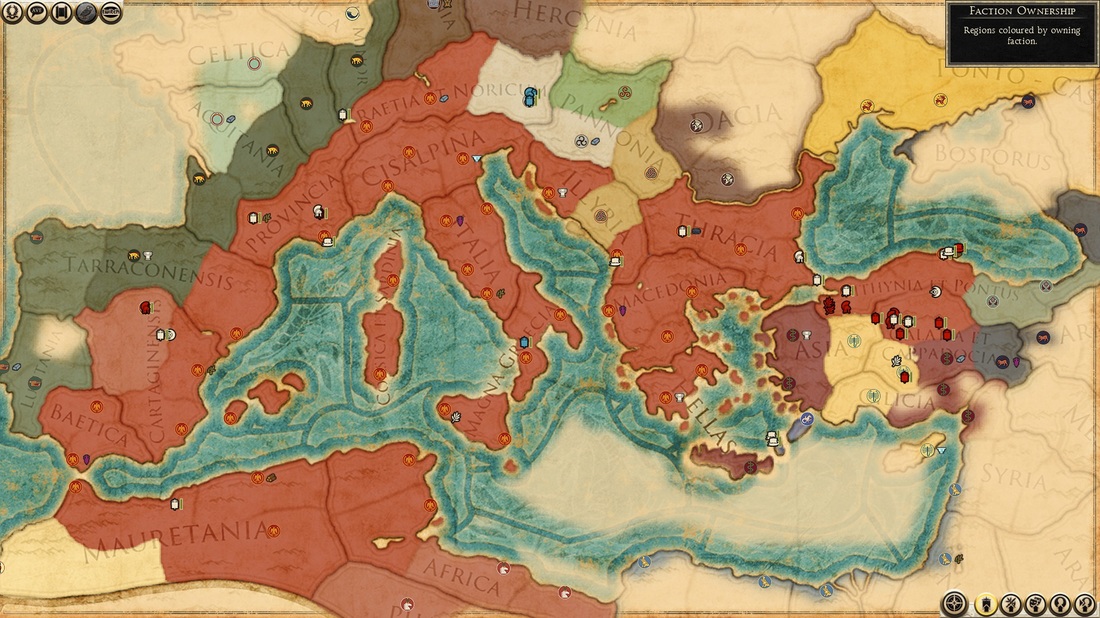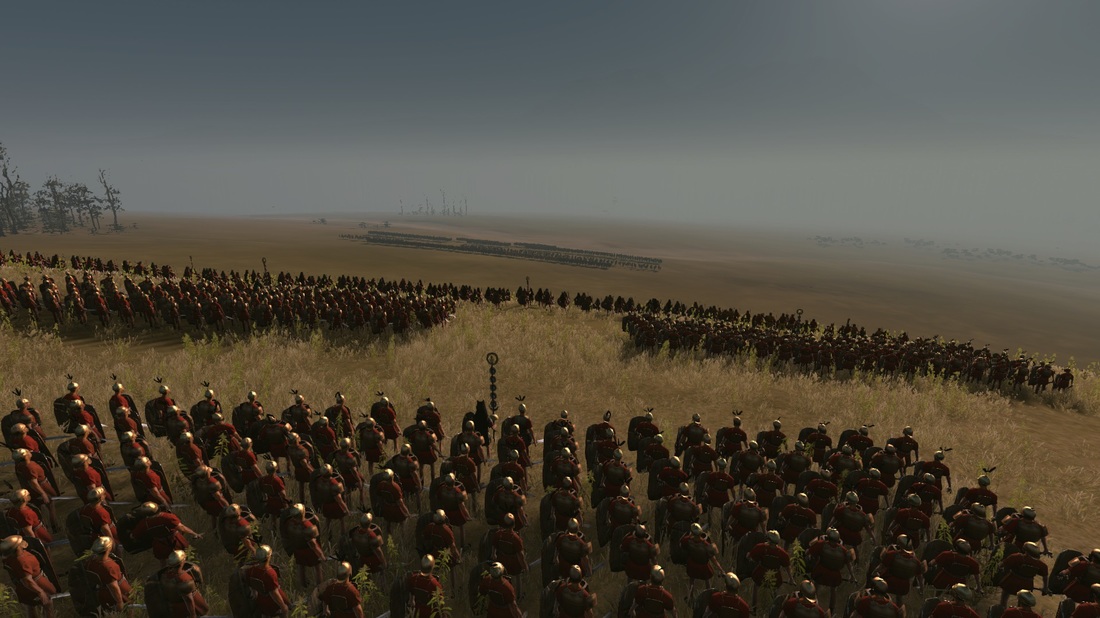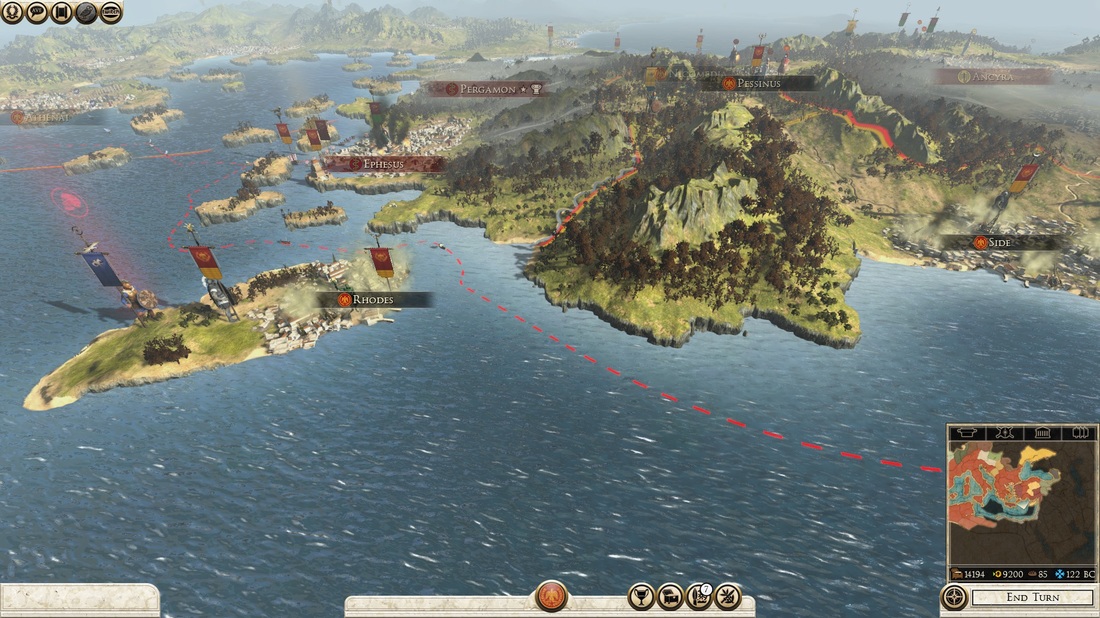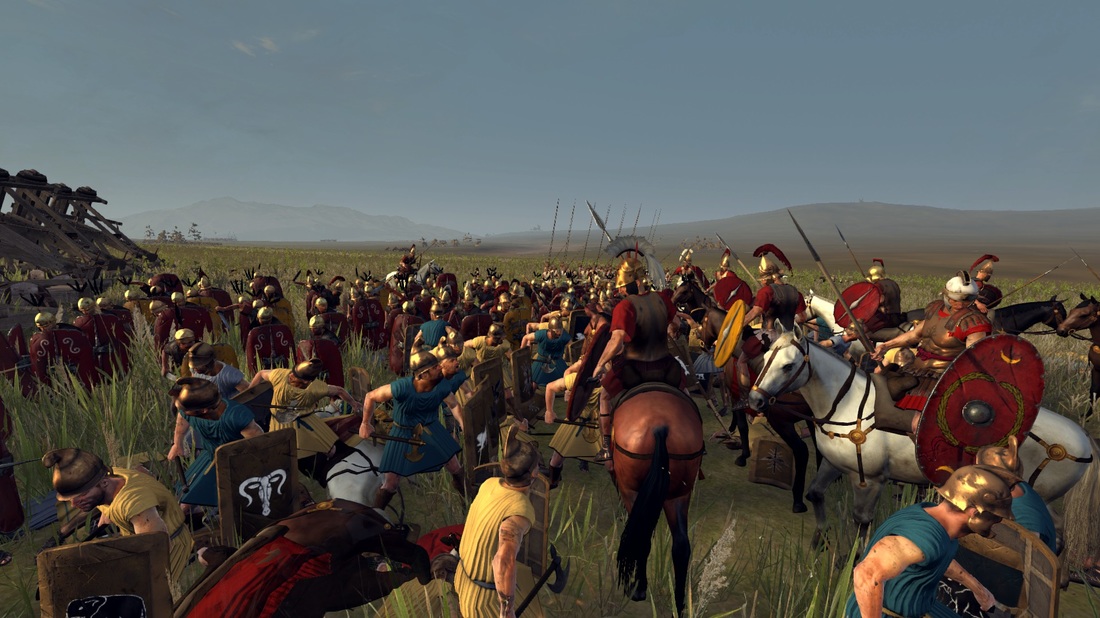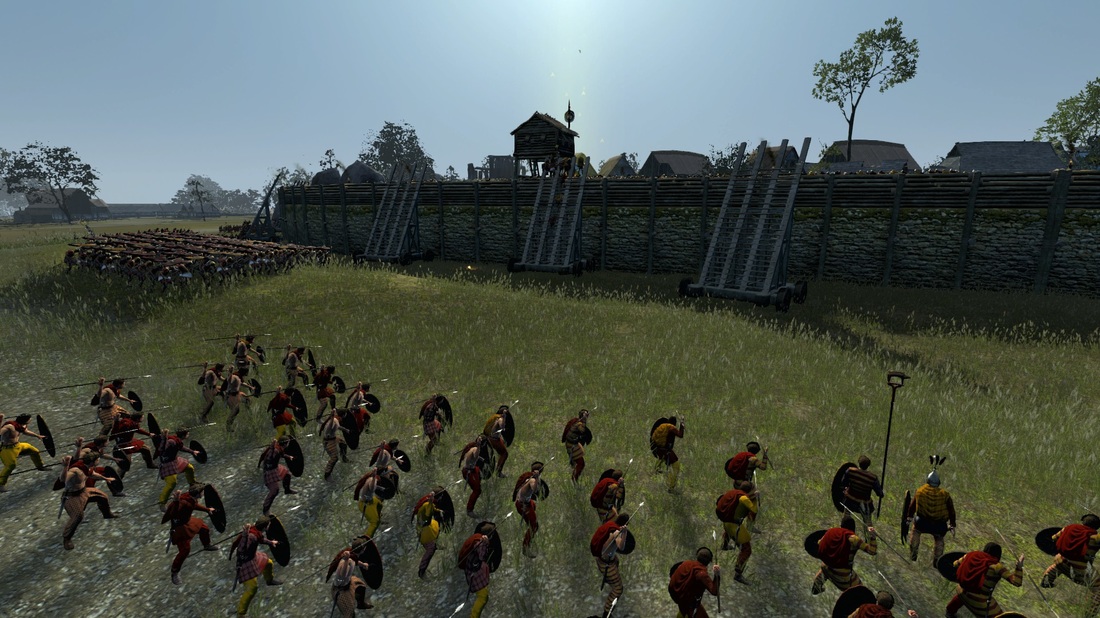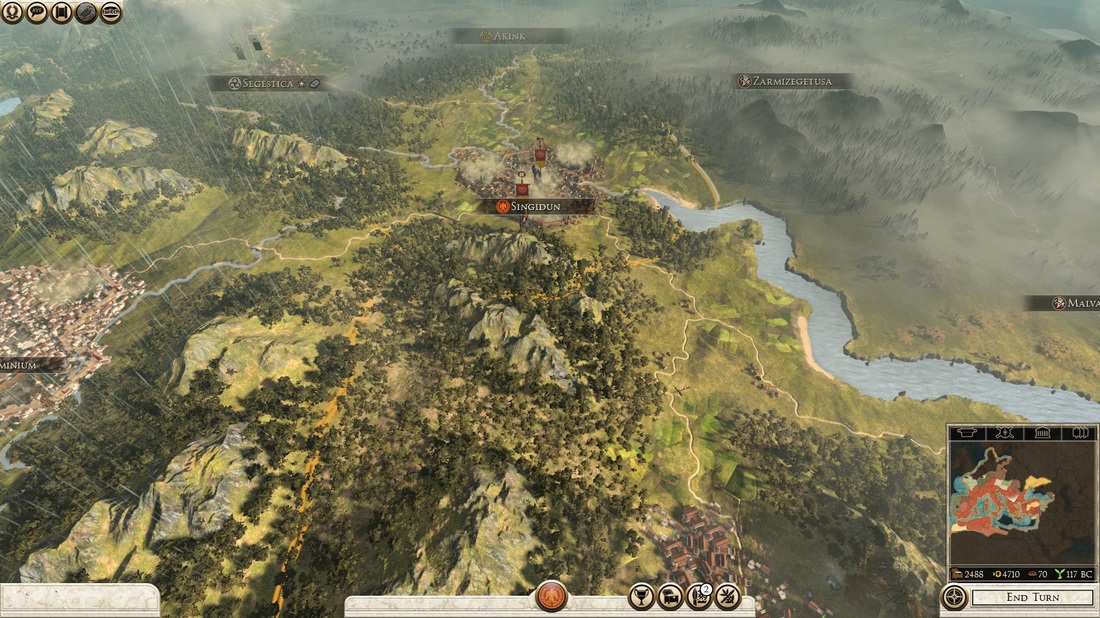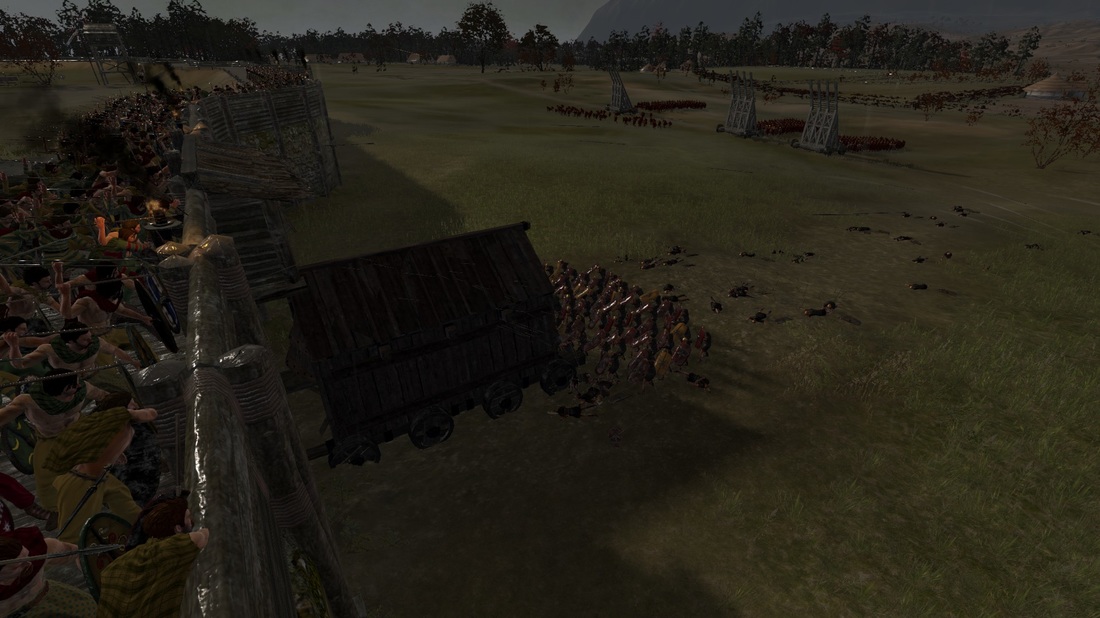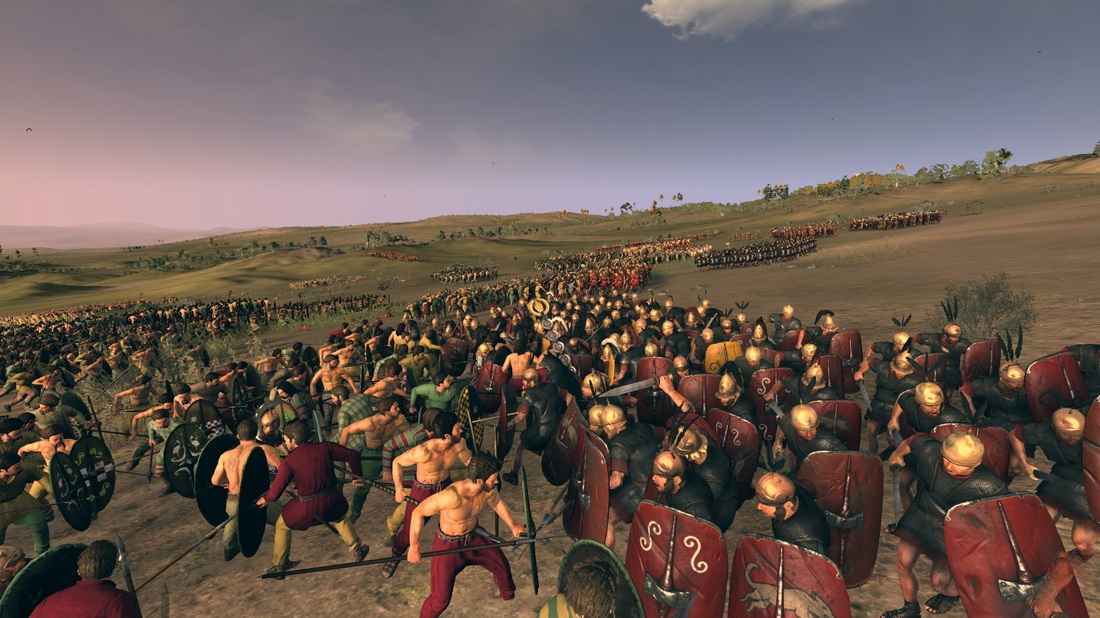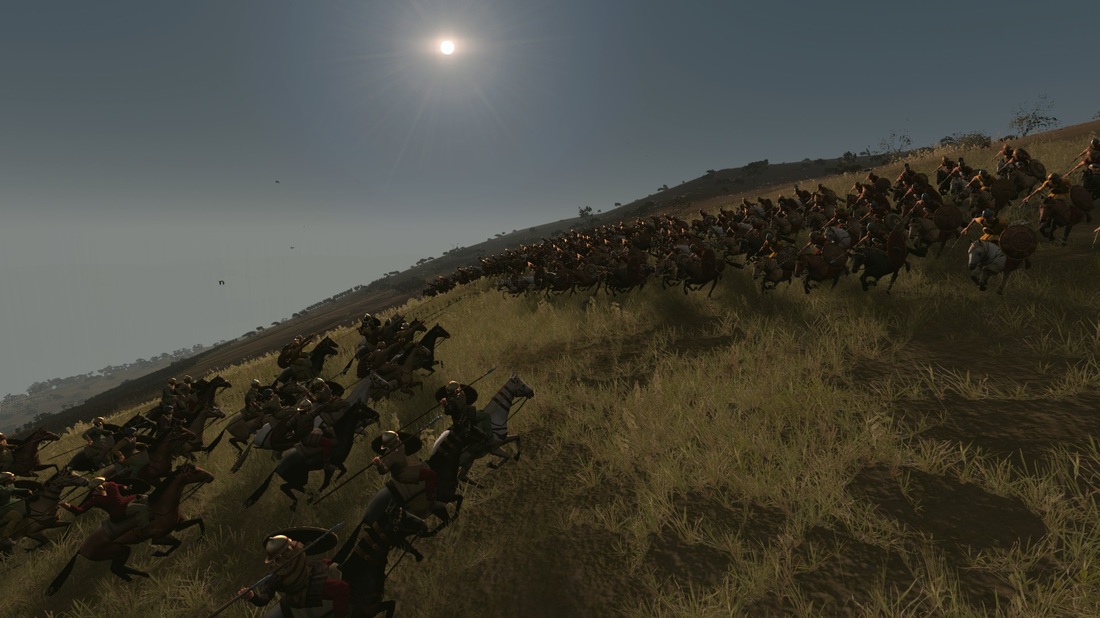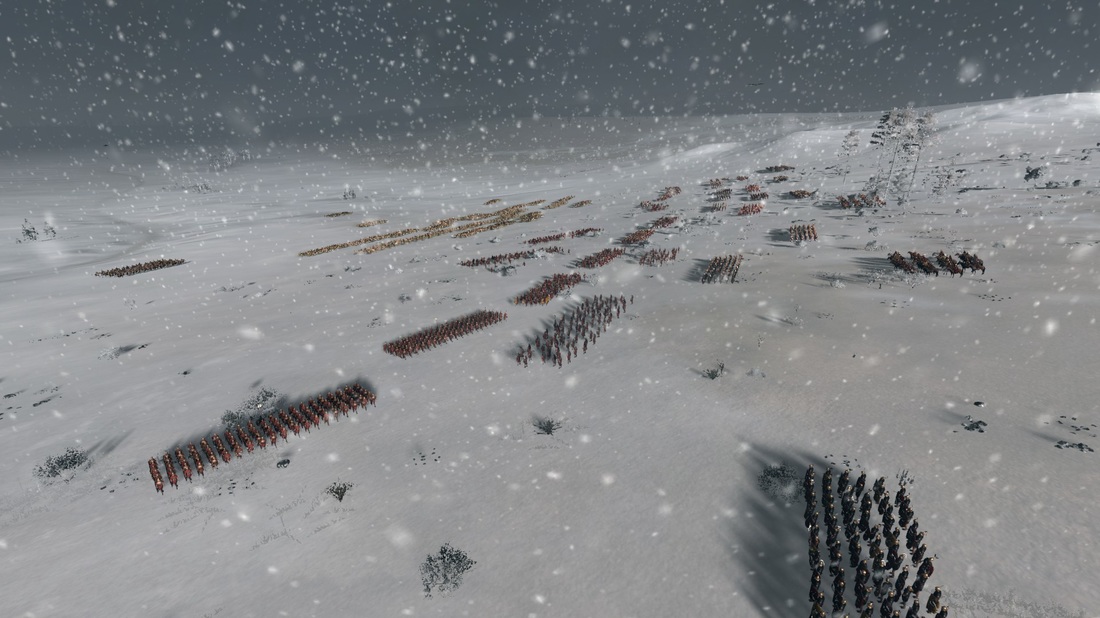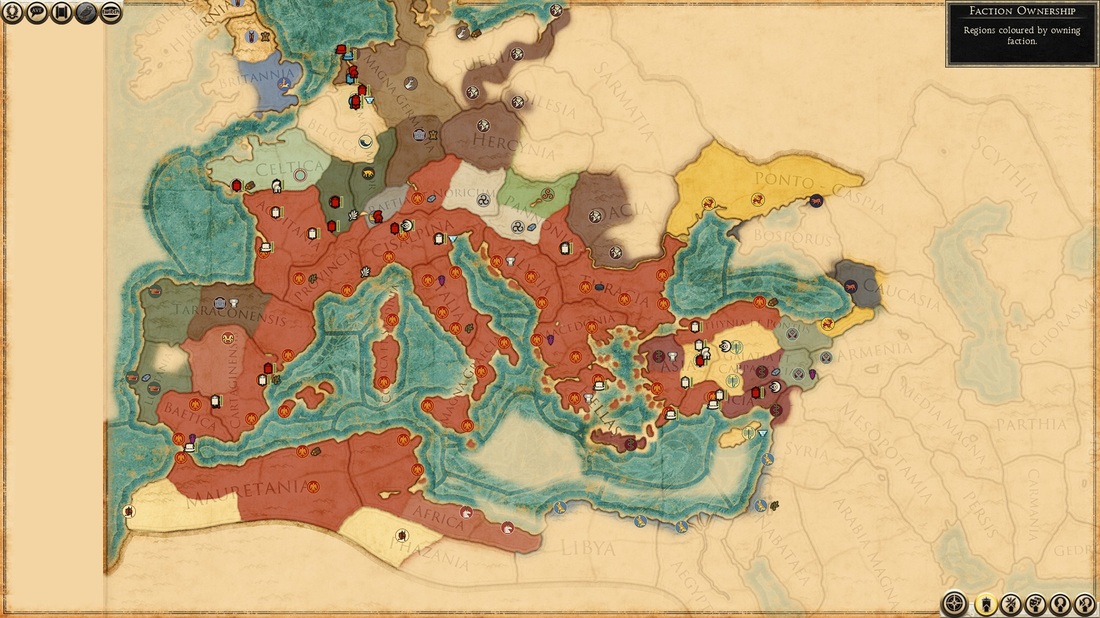Chapter V - Excelsior
|
The Senate's Demands
"Ever Upward" - Completely control 10 provinces |
The Senate's Ambitions
"Into Asia" – Hold at least one settlement in Cilicia, Asia, and Bithynia et Pontus "The Danubian Frontier" – Hold at least one settlement in Pannonia and Thracia "The Levant" – Hold at least one settlement in Syria and Nabataea "The Gallic Wars" – Hold the entirety of Aquitania, Celtica, Belgica, or Germania Minor "Military Reforms" – Complete the Remuneration Reforms (Complete) |
127 BC
Winter 126 BC – The rapid expansion of the Republic was a source of pride for its citizens and had brought great profit through trade, land, plunder, and slaves. Serving in the legions was taken as a serious civic responsibility and most soldiers and officers proudly purchased and prepared their own weapons and field kit. In an effort to improve discipline and standardization, the Remuneration Reforms decreed by the Senate lifted this expectiation. With the growth of the legions, the proportion of soldiers and officers that hailed from the wealthy nobility had drastically declined and senators and officers alike had become aware of growing deficiencies in equipment. With the new reforms the legions became a viable, though potentially lethal, career choice for Roman citizens instead of a costly social responsibility.
The incorporation of large populations of other cultures had changed other aspects of Roman policy. After two major slave rebellions, and myriad episodes of cultural strife, the Senate was now demanding a consolidation of the Republic’s authority rather than further extension of Roman dominance. The end of war against the Greeks and Averni was still elusive, but the legions would now be focused on securing the Roman borders, supporting the construction of infrastructure and fortifications, and helping to shape formal provincial administrations. Rome had benefited greatly at the expense of its neighbors and the Senate had no intention of losing its new territory.
The incorporation of large populations of other cultures had changed other aspects of Roman policy. After two major slave rebellions, and myriad episodes of cultural strife, the Senate was now demanding a consolidation of the Republic’s authority rather than further extension of Roman dominance. The end of war against the Greeks and Averni was still elusive, but the legions would now be focused on securing the Roman borders, supporting the construction of infrastructure and fortifications, and helping to shape formal provincial administrations. Rome had benefited greatly at the expense of its neighbors and the Senate had no intention of losing its new territory.
Spring 125 BC – The Averni had proven unreasonably belligerent and no Latin diplomat had been able to get more than threats in return for their overtures of peace. Provincia was vulnerable to barbarian incursions, and the Celtic warband calling itself the Champions of Rudianos had been able to raid and occupy the countryside with impunity until now. The I Legion, responsible for the region’s defence, was aware that the only reason Provincia was still in Roman hands was because the Averni warriors were simultaneously fighting other Celtic tribes to the far north. After his legion repelled the Champions of Rudianos outside the walls of Massalia, Gaius Silius Quadratus, commander of the I Legion and patriarch of the House of Julia, was elected consul of Rome. Utilizing all of his considerable influence in the capital to organize and fund an official campaign in Gallia, the Julii would assure Rome’s safety by conquering the barbarians that threatened her.
Summer 124 BC – Spurius Memmius Domitianus, commander of the IV Legion, was determined not to allow the Junii to monopolize the plunder and glory that awaited in Gallia. His legion was tasked with the defense of the Alpine passes, but the patricians of his house, the Junii, urged him to move on the Averni. Leaving the Alps open, the IV Legion marched into the heart of Averni territory. Memmius Domitianus then brought great fame to his legion and the Junii by quickly ransacking the Averni homeland in Nemossos. The outraged Celts sent armies to retake their stronghold from the Romans, but the IV Legion was able to repel the disorganize forces.
Winter 122 BC – Fortunately for the Roman Republic, the Averni had made many enemies. Their warmongering had caused a confederation of other Celtic tribes to rise up against them in the north of Gallia. Suffering now at the incursion of the Roman legions, the Averni had made peace with the confederation and allowed them to keep the land they had secured, and the native Celtici Iberians had conquered all of the former Averni lands in Hispania. The Celtici had warm relations with Rome and trade had prospered with the barbarian tribe ever since. With the IV Legion occupying the former seat of their king and the I Legion besieging another of their strongholds at Burdigala, the Roman Commanders of the Gallic War saw victory on the horizon.
The Eastern War had also taken a turn for the better. The long blockade of the kingdom of Rhodos, had finally ended when the XV Legion had arrived to assault the city. Together with the VI and XIII fleets, the city was taken and the kingdom of Rhodos was toppled. The VII and XVI Legions were meanwhile marching south from Nicomedia in hopes of securing the southern coast of Anatolia. The armies of Pergamon were still a great threat to the Roman occupiers of Asia Minor, and the king of Cyprus, a subordinate of the great Pharaoh in Alexandria, was proving the Roman’s smartest opponent and had profited greatly during the war at the expense of his weakened allies.
The Eastern War had also taken a turn for the better. The long blockade of the kingdom of Rhodos, had finally ended when the XV Legion had arrived to assault the city. Together with the VI and XIII fleets, the city was taken and the kingdom of Rhodos was toppled. The VII and XVI Legions were meanwhile marching south from Nicomedia in hopes of securing the southern coast of Anatolia. The armies of Pergamon were still a great threat to the Roman occupiers of Asia Minor, and the king of Cyprus, a subordinate of the great Pharaoh in Alexandria, was proving the Roman’s smartest opponent and had profited greatly during the war at the expense of his weakened allies.
Spring 121 BC – Faustus Pontidius Marcellus, the commander of the XV Legion, had released most of the common soldiery of Rhodos that had been captured in a gesture of goodwill towards the Greeks. One of those who had been released was a young nobleman named Prokopios who immediately began to gather an army of former soldiers and mercenaries in the hills of the Rhodian countryside. By the spring, he marched this army, calling itself the Champions of Olympus, on the utterly surprised Pontidius Marcellus in an attempt to force the XV Legion out of the city. Marcellus met the enemy army outside the city and defeated it at great loss for his legion. With the island finally subdued, it would be years before the XV Legion was fit enough to further aid in the Eastern War.
Summer 120 BC – With the assistance of the IX Fleet, Tiberius Atilius Regulus had besieged the city of Ephesus. Regulus had intended to assault the city quickly but found that overcoming the defenses would need siege engines and time to construct them. At the beginning of summer, the defending commander sallied forth and attacked the besieging army before they could finish their preparations. The Greeks had impressive siege engines of their own including great onagers that flung boulders onto the closely packed Roman soldiers. The VII Legion was unable to hold the field but also found itself unable to retreat. Most of the legion was killed or captured, including Atilius Regulus who died in combat. The rising star of the Julii had been slain, and the glorious VII Legion would take many years to be restored.
In Gallia, the I Legion occupied the coastal village of Burdigala. Consul Gaius Silius Quadratus, the almost seventy year old patriarch of the Julii, had decided that fertile Gallia was worth heavy investment. Barracks would be built and settlers from Italia would tame the land for Roman use. The local populations would be introduced to civilized culture and Gallia would be a great source of manpower and food. Raw wealth would flow from the primitive gold mines of the Averni at Nemossos and Burdigala would open up trade routes along the Atlantic coast. It rankled Quadratus that the glory of this conquest would have to be shared with the IV Legion and Spurius Memmius Domitianus of the House of Junia, but the consul would ensure the Julii profited greatly. Quadratus knew the task would have been much more difficult without the quick invasion led by his young rival.
In Gallia, the I Legion occupied the coastal village of Burdigala. Consul Gaius Silius Quadratus, the almost seventy year old patriarch of the Julii, had decided that fertile Gallia was worth heavy investment. Barracks would be built and settlers from Italia would tame the land for Roman use. The local populations would be introduced to civilized culture and Gallia would be a great source of manpower and food. Raw wealth would flow from the primitive gold mines of the Averni at Nemossos and Burdigala would open up trade routes along the Atlantic coast. It rankled Quadratus that the glory of this conquest would have to be shared with the IV Legion and Spurius Memmius Domitianus of the House of Junia, but the consul would ensure the Julii profited greatly. Quadratus knew the task would have been much more difficult without the quick invasion led by his young rival.
Autumn 119 BC – Ephesus was still blockaded by the IX Fleet and the XVI Legion had moved into initiate a new siege on the weakened city. Pessimistic about their chances in the field, the defenders attempted to run the blockade but the attack was unsuccessful. The few defenders that were left gave up the city to the besiegers. Later that season, the king of Pergamon finally accepted envoys from the Roman Senate. Tired of bearing the brunt of the war, the king accepted a truce. Rome would keep the coastline it now occupied and pay a negligible amount in gold as reparations to the Greek kingdom. While the Cypriot kingdom and the distant Pharaoh were still actively hostile with Rome, the Eastern War was effectively over.
At Delminium, the newly formed XIX Legion completed its first action of note and took the barbarian settlement from its Celtic masters, the Scordisci. This linked the Roman territories of Cisalpina with Macedonia and brought the entire Adriatic coast under Roman control. While the violent occupation ruined the tolerant relations with the eastern Celts, the rhetoric of the Senate had been pushing the legions to consolidate Illyria and all lands up to the Danube River. Tiberius Salvius Agricola, a junior member of the Julii and commander of the XIX Legion, hoped to capitalize on the gold and fame this campaign would bring. With similar ambitions, Gnaeus Cosconius Crassipes of the House of Cosconia led the XIV Legion to victory against a large Scordisci warband near the Danube. Unfortunately for the Roman settlers in Thracia, another warband was raiding unchecked further east.
At Delminium, the newly formed XIX Legion completed its first action of note and took the barbarian settlement from its Celtic masters, the Scordisci. This linked the Roman territories of Cisalpina with Macedonia and brought the entire Adriatic coast under Roman control. While the violent occupation ruined the tolerant relations with the eastern Celts, the rhetoric of the Senate had been pushing the legions to consolidate Illyria and all lands up to the Danube River. Tiberius Salvius Agricola, a junior member of the Julii and commander of the XIX Legion, hoped to capitalize on the gold and fame this campaign would bring. With similar ambitions, Gnaeus Cosconius Crassipes of the House of Cosconia led the XIV Legion to victory against a large Scordisci warband near the Danube. Unfortunately for the Roman settlers in Thracia, another warband was raiding unchecked further east.
Spring 117 BC – The city of Rhodes saw further trouble after the departure of the battered XV Legion. The chaos in the captured city allowed a huge slave rebellion to erupt across the island. The slave army, armed with stolen weapons and armor, stormed the ill-prepared city and looted all that had been spared by the Romans. The slaves stole the merchants’ ships from the city’s harbor and took to the sea. The IX and XIII Fleets rushed to respond, but the slaves were well ahead of them.
The XIX Legion continued to prosecute the invasion of the Scordisci lands. Reinforced by the XIV Legion, Agricola Salvius assaulted the Celtic stronghold at Singidun and scattered the remainder of the Scordisci tribe. Aware that the river would likely provide a perfect boundary for Roman control of the region, Salvius immediately began fortifying Singidun and the surrounding lands. The Scordisci army that had ranged into Thracia was caught and ambushed by the V Legion who emerged with high casualties but victorious.
The XIX Legion continued to prosecute the invasion of the Scordisci lands. Reinforced by the XIV Legion, Agricola Salvius assaulted the Celtic stronghold at Singidun and scattered the remainder of the Scordisci tribe. Aware that the river would likely provide a perfect boundary for Roman control of the region, Salvius immediately began fortifying Singidun and the surrounding lands. The Scordisci army that had ranged into Thracia was caught and ambushed by the V Legion who emerged with high casualties but victorious.
Autumn 115 BC – After a summer of intense barbarian activity in Gallia and the Alps, the Roman legions were struggling to regain dominance in the hostile terrain. The Averni had outmaneuvered the I and IV Legions and retaken their ancient seat at Nemossos while the continuously ill-fortuned Roman settlement at Octuduron was overran by another Celtic tribe known as the Helvetii. The Helvetii were allies of the Averni who had been pushed out of their homeland in the Alps by the Greek overlords of Massalia generations ago. Now restored to some semblance of power, the Helvetii descended from the mountains and besieged the Roman garrison at Medhlan.
The Averni warband at Nemossos was quickly confronted by the I and IV Legions and deftly driven from the town by the newly appointed commander of the I Legion, Faustus Terentius Albus, a rising member of the House of Julii. The House’s new patriarch, Gnaeus Plinius Marcellus, sought to follow his predecessor into the rank of Consul, and Albus was eager to repair the damage to the family’s reputation from allowing the barbarian stronghold to fall in the first place. With the traditional defenders of the Republic’s northern borders tied up in Gallia. The XVI and XIX Legions rushed to help the beleaguered city of Medhlan.
The Averni warband at Nemossos was quickly confronted by the I and IV Legions and deftly driven from the town by the newly appointed commander of the I Legion, Faustus Terentius Albus, a rising member of the House of Julii. The House’s new patriarch, Gnaeus Plinius Marcellus, sought to follow his predecessor into the rank of Consul, and Albus was eager to repair the damage to the family’s reputation from allowing the barbarian stronghold to fall in the first place. With the traditional defenders of the Republic’s northern borders tied up in Gallia. The XVI and XIX Legions rushed to help the beleaguered city of Medhlan.
Winter 114 BC – Plinius Marcellus knew that his young kinsman, Albus, would be unable to deliver Gallia to the Republic by continuing to chase the elusive Averni. While the citizens of Rome saw the Averni barbarians as their natural adversaries and greatest antagonists, Marcellus saw that far more of Gallia was under the sway of a confederation of tribes led by the Atrebartes, a group that the Roman generals had found prudent to avoid conflict with so far. If Roman hegemony was to be possible in Gallia, there could be no other authority for the Gallic people to turn towards and, in pursuance of this doctrine, Marcellus came to an infrequent agreement with his rival commanding the IV Legion.
Much farther north, Roman envoys had encountered a Germanic tribe called the Frisii who were hostile with the Atrebartes and their allies. At Marcellus’s suggestion the smaller tribe of Germans bowed to Roman rule on terms that the Republic would help them destroy their enemies and the Romans would not interfere with local Frisii affairs. While Albus plundered the gold hordes of Nemossos, the IV Legion quickly attacked the lightly defended Celts of Lemonum bringing valuable iron mines under Roman control, rounding out a suitable defensive boundary that solidified the Roman occupation of southern Gallia, and showing the Gallic people that neither the Averni nor the Atrebartes could check Roman power.
Much farther north, Roman envoys had encountered a Germanic tribe called the Frisii who were hostile with the Atrebartes and their allies. At Marcellus’s suggestion the smaller tribe of Germans bowed to Roman rule on terms that the Republic would help them destroy their enemies and the Romans would not interfere with local Frisii affairs. While Albus plundered the gold hordes of Nemossos, the IV Legion quickly attacked the lightly defended Celts of Lemonum bringing valuable iron mines under Roman control, rounding out a suitable defensive boundary that solidified the Roman occupation of southern Gallia, and showing the Gallic people that neither the Averni nor the Atrebartes could check Roman power.
Marcellus was already on his way to Rome before the IV Legion had made their move, and when he arrived in the city with his VII Legion’s captives and treasure from the war in the East, he announced victory over the barbarians and the formation of the Roman province of Aquitania in Gallia. With credit placed almost entirely on the Julii, the Senate saw fit to elect Marcellus as Consul and award him governance of the new region to the understandable annoyance of his house’s rivals. A triumph was held in Rome to honor this victory, as well as the Roman success in the Eastern War against the Greeks and against the Celts of Illyria.
|
The Senate's Demands
"Ever Upward" - Completely control 10 provinces (Complete) |
The Senate's Ambitions
"Into Asia" – Hold at least one settlement in Cilicia, Asia, and Bithynia et Pontus (Complete) "The Danubian Frontier" – Hold at least one settlement in Pannonia and Thracia (Complete) "The Levant" – Hold at least one settlement in Syria and Nabataea (Failed) "The Gallic Wars" – Hold the entirety of Aquitania, Celtica, Belgica, or Germania Minor (Complete) "Military Reforms" – Complete the Remuneration Reforms (Complete) |
114 BC
